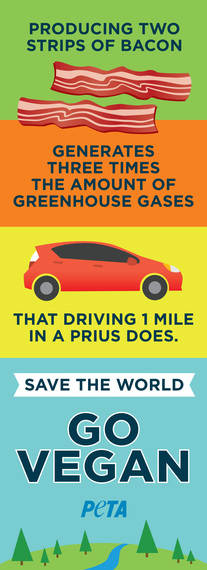
With Earth Day approaching, people are thinking about what they can do to combat climate change and help the environment. But the usual activities -- such as recycling and using cloth bags and reusable water bottles -- aren't enough. Even driving a hybrid car, as I do, isn't enough.
As a new United Nations report shows, climate change is already affecting agriculture, ecosystems, water supplies, human health and people's livelihoods. We can't weather this storm with token environmental actions alone. We must take significant steps to reduce our impact on a warming planet.
If you're serious about saving the environment, the most important thing that you can do is to stop eating meat, eggs and dairy products.
That's the message that PETA is taking to electric car charging stations in Los Angeles and Phoenix, with help from longtime PETA supporter and The Walking Dead star Christian Serratos, via these provocative pro-vegan ads:
The ads will be up in time for Earth Day and will remain in place for six months. Many well-meaning environmentalists need to take a good hard look at what they're eating, as that bacon that they may have had for breakfast is a big part of the problem. All the electric cars in the world can't make up for the impact that meat production has on the Earth.
A recent study by scientists at Chalmers University of Technology in Sweden confirmed that cutting greenhouse-gas emissions from transportation and energy use alone won't be enough to curb climate change. Dr. Fredrik Hedenus, the lead scientist of the study, believes that "reducing meat and dairy consumption is key to bringing agricultural climate pollution down to safe levels." Similarly, Ilmi Granoff from the Overseas Development Institute has urged officials to "[f]orget coal. Forget cars. The fastest way to address climate change would be to dramatically reduce the amount of meat people eat."
The Swedish researchers estimate that by 2050, beef and lamb production will account for half of all agricultural greenhouse-gas emissions but only a paltry 3 percent of people's caloric intake. They expect that cheese and other dairy products will cause a quarter of agricultural climate pollution in the next 40 years.
The billions of chickens, turkeys, pigs and cows who are raised for food each year in the U.S. produce a tremendous amount of excrement, releasing methane and other greenhouse gasses into our atmosphere. Methane, which is at least 20 times more potent than carbon dioxide, accounts for 9 percent of the greenhouse-gas emissions in this country. And the 523 million chickens raised and killed each year in Delaware and Maryland alone generate enough waste to fill the dome of the U.S. Capitol about 50 times in a single year--or almost once a week.
And each cow emits approximately 66 to 79 gallons of methane every single day. There are currently 88 million cattle in the United States. You do the math. Together, these cows reportedly produce more methane than landfills, natural gas leaks and fracking.
Carbon dioxide is another problem. According to the Environmental Defense Fund, "If every American skipped one meal of chicken per week and substituted vegetables and grains ... the carbon dioxide savings would be the same as taking more than half a million cars off of U.S. roads." Imagine what a difference we could make if we stopped eating animal-based foods entirely.
If you care about the environment and animals, don't just buy local or organic foods. Be bold! Take it all the way and buy vegan. It's really the only way to save the planet. Here's some more food for thought for your Earth Day:
- A German study conducted in 2008 concluded that a meat-eater's diet is responsible for more than seven times the volume of greenhouse-gas emissions that a vegan's diet is.
- A Loma Linda University study shows that vegans have the smallest carbon footprint, generating a 41.7 percent smaller volume of greenhouse gasses than meat-eaters do and a 13.9 percent smaller volume than vegetarians.
- The president of the Worldwatch Institute has said that the "world's supersized appetite for meat" is one of the main reasons why greenhouse-gas emissions are increasing rapidly.
- According to researchers from the University of California-Riverside, cooking just one charbroiled burger causes as much pollution as driving an 18-wheeler for 143 miles.
- Researchers at the University of Chicago concluded that switching from a standard American diet to vegan meals is more effective in the fight against climate change than switching from a standard American car to a hybrid is.
- The United Nations has concluded that a global shift toward vegan eating is necessary to combat the worst effects of climate change.
Let's not wait until extreme weather is a daily occurrence -- and our resources are sparse -- to go vegan. Take that essential step now, in honor of Earth Day. Visit PETA.org today to get started.
